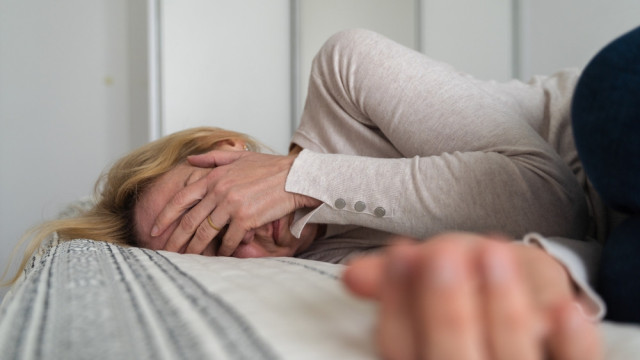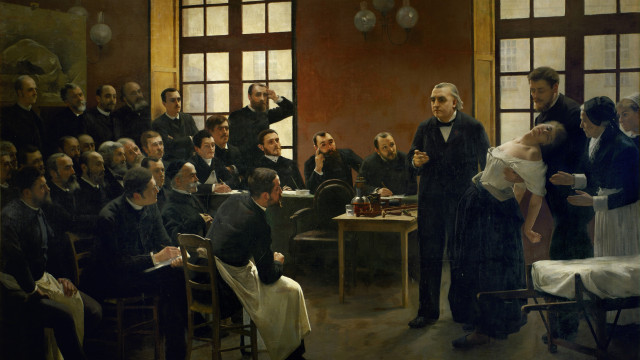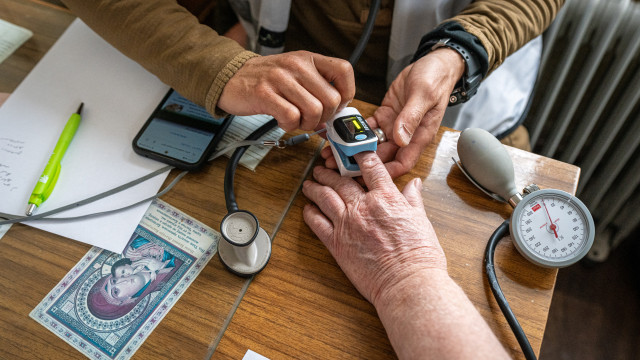





























See Also
See Again
© Shutterstock
0 / 30 Fotos
You’re stressed or feeling anxious
- A certain amount of stress is normal and can be beneficial, but excessive stress can have a negative effect on your sleep. The main reason for this is the release of cortisol, a stress hormone that keeps you alert and prevents you from sleeping.
© Shutterstock
1 / 30 Fotos
You’re stressed or feeling anxious
- Cortisol is a natural hormone that is released when you wake up and helps you to stay more alert. However, it becomes a nightmare when you try to sleep.
© Shutterstock
2 / 30 Fotos
You’re stressed or feeling anxious
- Your subconscious can be overwhelmed by racing, intrusive thoughts and unpleasant feelings. Stress and anxiety can manifest themselves in subtle ways and cause you to wake up frequently during the night.
© Shutterstock
3 / 30 Fotos
It might be your gut bacteria
- An imbalance in your gastrointestinal microbiome can disrupt your sleep. This is usually related to an excess of cortisol, which can affect the good bacteria in your digestive system.
© Shutterstock
4 / 30 Fotos
It might be your gut bacteria
- An unbalanced microbiome also has difficulty converting tryptophan (an amino acid) into serotonin (a neurotransmitter), which can affect your sleep.
© Shutterstock
5 / 30 Fotos
It might be your gut bacteria
- If you are struggling with this, taking probiotics may be the answer to your problem. They can improve your gastrointestinal microbiome and therefore the quality of your sleep.
© Shutterstock
6 / 30 Fotos
Perhaps it's your blood sugar levels
- Your blood sugar level fluctuates slightly during the day and if it drops sharply before bedtime, it can affect your sleep.
© Shutterstock
7 / 30 Fotos
Perhaps it's your blood sugar levels
- Low blood sugar levels during sleep can be caused by a number of factors, including diet. When blood sugar levels are low, the adrenal glands release cortisol, which in turn can disrupt the quality of your sleep.
© Shutterstock
8 / 30 Fotos
Perhaps it's your blood sugar levels
- Maintaining a stable blood sugar level can be achieved through a balanced diet. A light snack before bedtime that contains protein and fats such as nuts can help you keep it stable.
© Shutterstock
9 / 30 Fotos
Alcohol
- A glass of wine at night feels relaxing. However, if you consume alcohol within four hours of going to bed, it can affect your sleep.
© Shutterstock
10 / 30 Fotos
Smoking
- Nicotine, in whatever form, can keep you awake at night because it has a stimulating effect. This is exactly what you don't need if you want to sleep like a rock.
© Shutterstock
11 / 30 Fotos
Caffeine, of course
- A lot of people enjoy coffee and other caffeinated drinks such as tea. However, this is a stimulant that you should avoid. If you drink it, have your cup at least six hours before going to bed.
© Shutterstock
12 / 30 Fotos
Nutrient deficiency
- Perhaps your body needs a nutrient that it is currently lacking, such as vitamin D. This essential vitamin plays a crucial role in the production of melatonin, a sleep-regulating hormone.
© Shutterstock
13 / 30 Fotos
Nutrient deficiency
- While some foods contain vitamin D, the best source is still the sun. Sun exposure helps regulate your circadian rhythm. This means your eyes stay closed at night.
© Shutterstock
14 / 30 Fotos
Nutrient deficiency
- Magnesium is another nutrient that can help you get a good night's sleep. It is responsible for various bodily functions, such as boosting gamma-aminobutyric acid (GABA), a neurotransmitter that helps your body to relax.
© Shutterstock
15 / 30 Fotos
Is it your hormones?
- A hormonal imbalance could be the reason why your sleep cycle is repeatedly interrupted. It is often difficult for menopausal women to get a good night's sleep.
© Shutterstock
16 / 30 Fotos
Is it your hormones?
- Low progesterone levels, which typically occur during menstruation, can also have a negative effect on sleep quality.
© Shutterstock
17 / 30 Fotos
You might have sleep apnea
- If you suffer from sleep apnea, you stop breathing briefly during sleep, with pauses that can last up to 30 seconds. Sleep apnea can cause you to move around and wake up frequently during the night.
© Shutterstock
18 / 30 Fotos
You might have sleep apnea
- Sleep apnea not only disturbs sleep, but is also associated with other health conditions, such as cardiovascular problems, and causes terrible discomfort.
© Shutterstock
19 / 30 Fotos
Is nocturia stealing your nights?
- Do you get up at night to pee again and again? Then you may be dealing with nocturia. This condition can severely affect the quality of your sleep.
© Shutterstock
20 / 30 Fotos
Is nocturia stealing your nights?
- An overactive bladder triggered by low levels of the antidiuretic hormone vasopressin can be the cause of nocturia. This can happen as you get older.
© Shutterstock
21 / 30 Fotos
Prediabetes might be to blame
- There are other factors that cause you to pee frequently at night. You may be suffering from nocturnal hyperglycemia, which, unlike the diet-related reasons mentioned previously, can be linked to diabetes.
© Shutterstock
22 / 30 Fotos
Prediabetes might be to blame
- If you experience other symptoms in addition to the urge to pee, such as irritability and headaches, you should talk to your doctor. Restless leg syndrome can also be a sign of fluctuating blood sugar levels at night.
© Shutterstock
23 / 30 Fotos
Your liver function might be off
- An imbalance in liver function can really affect your sleep. The liver is responsible for metabolizing melatonin, which is crucial for the sleep-wake cycle.
© Shutterstock
24 / 30 Fotos
Your liver function might be off
- Pay a visit to your doctor if you have other symptoms such as itchy skin, loss of appetite or tenderness in the liver area. Liver conditions should not be ignored.
© Shutterstock
25 / 30 Fotos
Your thyroid might be the culprit
- If your thyroid gland is overactive and produces a large amount of hormones, this is called hyperthyroidism. If you suffer from this, you may feel a little restless and irritable, and it is quite natural that you find it difficult to sleep.
© Shutterstock
26 / 30 Fotos
Your thyroid might be the culprit
- But the opposite, hypothyroidism, can also disturb your sleep. An underactive thyroid can cause muscle and joint pain and make you more susceptible to anxiety.
© Shutterstock
27 / 30 Fotos
A change to your circadian rhythm
- The process that regulates our sleep–wake cycle can change. Jet lag, for example, can severely affect our sleep.
© Shutterstock
28 / 30 Fotos
A change to your circadian rhythm
- If you work shifts, it'll come as no surprise that your job is a big circadian rhythm disruptor. Sources: (Health Digest) (Rise Science) (CDC) (CDEC) (Nutrients) (Yale Medicine) (Sleep Medicine Research) (Diabetes.co.uk) See also: How food can help you sleep
© Shutterstock
29 / 30 Fotos
© Shutterstock
0 / 30 Fotos
You’re stressed or feeling anxious
- A certain amount of stress is normal and can be beneficial, but excessive stress can have a negative effect on your sleep. The main reason for this is the release of cortisol, a stress hormone that keeps you alert and prevents you from sleeping.
© Shutterstock
1 / 30 Fotos
You’re stressed or feeling anxious
- Cortisol is a natural hormone that is released when you wake up and helps you to stay more alert. However, it becomes a nightmare when you try to sleep.
© Shutterstock
2 / 30 Fotos
You’re stressed or feeling anxious
- Your subconscious can be overwhelmed by racing, intrusive thoughts and unpleasant feelings. Stress and anxiety can manifest themselves in subtle ways and cause you to wake up frequently during the night.
© Shutterstock
3 / 30 Fotos
It might be your gut bacteria
- An imbalance in your gastrointestinal microbiome can disrupt your sleep. This is usually related to an excess of cortisol, which can affect the good bacteria in your digestive system.
© Shutterstock
4 / 30 Fotos
It might be your gut bacteria
- An unbalanced microbiome also has difficulty converting tryptophan (an amino acid) into serotonin (a neurotransmitter), which can affect your sleep.
© Shutterstock
5 / 30 Fotos
It might be your gut bacteria
- If you are struggling with this, taking probiotics may be the answer to your problem. They can improve your gastrointestinal microbiome and therefore the quality of your sleep.
© Shutterstock
6 / 30 Fotos
Perhaps it's your blood sugar levels
- Your blood sugar level fluctuates slightly during the day and if it drops sharply before bedtime, it can affect your sleep.
© Shutterstock
7 / 30 Fotos
Perhaps it's your blood sugar levels
- Low blood sugar levels during sleep can be caused by a number of factors, including diet. When blood sugar levels are low, the adrenal glands release cortisol, which in turn can disrupt the quality of your sleep.
© Shutterstock
8 / 30 Fotos
Perhaps it's your blood sugar levels
- Maintaining a stable blood sugar level can be achieved through a balanced diet. A light snack before bedtime that contains protein and fats such as nuts can help you keep it stable.
© Shutterstock
9 / 30 Fotos
Alcohol
- A glass of wine at night feels relaxing. However, if you consume alcohol within four hours of going to bed, it can affect your sleep.
© Shutterstock
10 / 30 Fotos
Smoking
- Nicotine, in whatever form, can keep you awake at night because it has a stimulating effect. This is exactly what you don't need if you want to sleep like a rock.
© Shutterstock
11 / 30 Fotos
Caffeine, of course
- A lot of people enjoy coffee and other caffeinated drinks such as tea. However, this is a stimulant that you should avoid. If you drink it, have your cup at least six hours before going to bed.
© Shutterstock
12 / 30 Fotos
Nutrient deficiency
- Perhaps your body needs a nutrient that it is currently lacking, such as vitamin D. This essential vitamin plays a crucial role in the production of melatonin, a sleep-regulating hormone.
© Shutterstock
13 / 30 Fotos
Nutrient deficiency
- While some foods contain vitamin D, the best source is still the sun. Sun exposure helps regulate your circadian rhythm. This means your eyes stay closed at night.
© Shutterstock
14 / 30 Fotos
Nutrient deficiency
- Magnesium is another nutrient that can help you get a good night's sleep. It is responsible for various bodily functions, such as boosting gamma-aminobutyric acid (GABA), a neurotransmitter that helps your body to relax.
© Shutterstock
15 / 30 Fotos
Is it your hormones?
- A hormonal imbalance could be the reason why your sleep cycle is repeatedly interrupted. It is often difficult for menopausal women to get a good night's sleep.
© Shutterstock
16 / 30 Fotos
Is it your hormones?
- Low progesterone levels, which typically occur during menstruation, can also have a negative effect on sleep quality.
© Shutterstock
17 / 30 Fotos
You might have sleep apnea
- If you suffer from sleep apnea, you stop breathing briefly during sleep, with pauses that can last up to 30 seconds. Sleep apnea can cause you to move around and wake up frequently during the night.
© Shutterstock
18 / 30 Fotos
You might have sleep apnea
- Sleep apnea not only disturbs sleep, but is also associated with other health conditions, such as cardiovascular problems, and causes terrible discomfort.
© Shutterstock
19 / 30 Fotos
Is nocturia stealing your nights?
- Do you get up at night to pee again and again? Then you may be dealing with nocturia. This condition can severely affect the quality of your sleep.
© Shutterstock
20 / 30 Fotos
Is nocturia stealing your nights?
- An overactive bladder triggered by low levels of the antidiuretic hormone vasopressin can be the cause of nocturia. This can happen as you get older.
© Shutterstock
21 / 30 Fotos
Prediabetes might be to blame
- There are other factors that cause you to pee frequently at night. You may be suffering from nocturnal hyperglycemia, which, unlike the diet-related reasons mentioned previously, can be linked to diabetes.
© Shutterstock
22 / 30 Fotos
Prediabetes might be to blame
- If you experience other symptoms in addition to the urge to pee, such as irritability and headaches, you should talk to your doctor. Restless leg syndrome can also be a sign of fluctuating blood sugar levels at night.
© Shutterstock
23 / 30 Fotos
Your liver function might be off
- An imbalance in liver function can really affect your sleep. The liver is responsible for metabolizing melatonin, which is crucial for the sleep-wake cycle.
© Shutterstock
24 / 30 Fotos
Your liver function might be off
- Pay a visit to your doctor if you have other symptoms such as itchy skin, loss of appetite or tenderness in the liver area. Liver conditions should not be ignored.
© Shutterstock
25 / 30 Fotos
Your thyroid might be the culprit
- If your thyroid gland is overactive and produces a large amount of hormones, this is called hyperthyroidism. If you suffer from this, you may feel a little restless and irritable, and it is quite natural that you find it difficult to sleep.
© Shutterstock
26 / 30 Fotos
Your thyroid might be the culprit
- But the opposite, hypothyroidism, can also disturb your sleep. An underactive thyroid can cause muscle and joint pain and make you more susceptible to anxiety.
© Shutterstock
27 / 30 Fotos
A change to your circadian rhythm
- The process that regulates our sleep–wake cycle can change. Jet lag, for example, can severely affect our sleep.
© Shutterstock
28 / 30 Fotos
A change to your circadian rhythm
- If you work shifts, it'll come as no surprise that your job is a big circadian rhythm disruptor. Sources: (Health Digest) (Rise Science) (CDC) (CDEC) (Nutrients) (Yale Medicine) (Sleep Medicine Research) (Diabetes.co.uk) See also: How food can help you sleep
© Shutterstock
29 / 30 Fotos
Is this why you keep waking up in the middle of the night?
Find out why you struggle with interrupted sleep
© Shutterstock
It's well known that a good night's sleep is essential for our long-term health and overall well-being. Nothing can replace those hours of rest when you're in dreamland. When your sleep is interrupted, it's important to find out why it's happening and address the problem. Waking up in the middle of the night can have many causes, such as the need to go to the bathroom, sugar consumption, or feeling restless.
In this gallery, we show you some of the reasons that can cause you to wake up in the middle of the night. Keep clicking, but don't fall asleep yet!
RECOMMENDED FOR YOU




























MOST READ
- Last Hour
- Last Day
- Last Week








